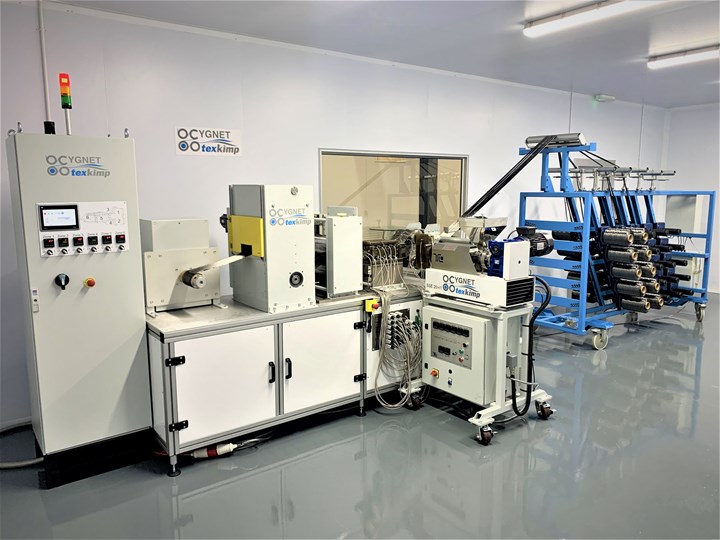Lab-Scale Thermoplastic Composite Lab Line to Support Innovation in Plastics Technology
Cygnet Texkimp’s Direct Melt Impregnation Composite Line aimed at supporting new materials and material combinations to for manufacture of thermoplastic prepregs and tapes.
A lab-scale version of a thermoplastic processing composite technology designed to help companies develop new materials and material combinations to manufacture prepregs and tapes is newly available from Cygnet Texkimp, an export-led British fiber handling and converting technology specialty manufacturer.

The company has installed one of these lab-scale versions of its Direct Melt Impregnation Thermoplastic Composite Line technology at its Northwich, U.K.-based innovation center to enable faster development of plastics technology through dedicated customer trials. The company is working with organizations from the automotive, aerospace, construction and energy sectors, many of which want to produce their own materials to fulfil their exact needs.
Said Cygnet Texkimp’s research & development specialist Ben Lloyd, “We’re enabling manufacturers to explore a new and novel technology, prove out their concepts, and carry out innovative product development before choosing to invest. The fast-moving composites sector needs this kind of dedicated environment to speed up adoption of new technology and support innovation. The response from the market has been phenomenal and we’re completing trials on a wide range of different materials.”
At 5m long and 1m wide, the lab-scale machine is half the size of the full-scale line (which was launched in 2020 as a compact solution with a small footprint) but delivers all the capability of the original technology. It is applicable for polymers ranging from PP to PEEK and can process a range of fibers including carbon, glass and hybrid versions. The technology is scalable to 600mm wide and can manufacture prepregs measuring down to 0.1mm in thickness.
When launched in 2020, The Direct Melt Impregnation Thermoplastic Composite Line was touted as the world’s first commercially available thermoplastic composite line capable of using polymer in standard form to create high-grade thermoplastic prepregs on an industrial scale.
The technology combines standard polymer pellets with a polymer and fiber matrix extrusion methodology to simplify and shorten the process of manufacturing thermoplastic prepreg materials while maintaining the quality of the end product. In this way, Cygnet Texkimp has created a short, space- and time-saving line that transforms fiber into thermoplastics in a compact space without requiring specialist knowledge to operate.
It was designed to transform the way high-grade thermoplastic composites are manufactured and make them more easily accessible to high-volume markets including automotive and construction where it can be used to manufacture strong, lightweight, durable, recyclable car parts and building materials quickly and reliably.
For high-volume automotive manufacturers and their customers, for example, the technology offers compelling sustainability and environmental benefits. Using thermoplastic parts such as bumpers, crash structures and interior components will make cars more easily reparable and recyclable as well as cleaner and less expensive to manufacture.
Related Content
-
Engineering Resins Compounder Expands to Take on More Scrap
Polymer Resources responds to sustainability push by upgrading plant with grinding and shredding equipment to take on both postindustrial and postconsumer reclaim.
-
How to Configure Your Twin-Screw Extruder -- Part 2
Follow these tips to configure your twin-screw elements to promote feeding and solids conveying.
-
What to Know About Your Materials When Choosing a Feeder
Feeder performance is crucial to operating extrusion and compounding lines. And consistent, reliable feeding depends in large part on selecting a feeder compatible with the materials and additives you intend to process. Follow these tips to analyze your feeder requirements.















